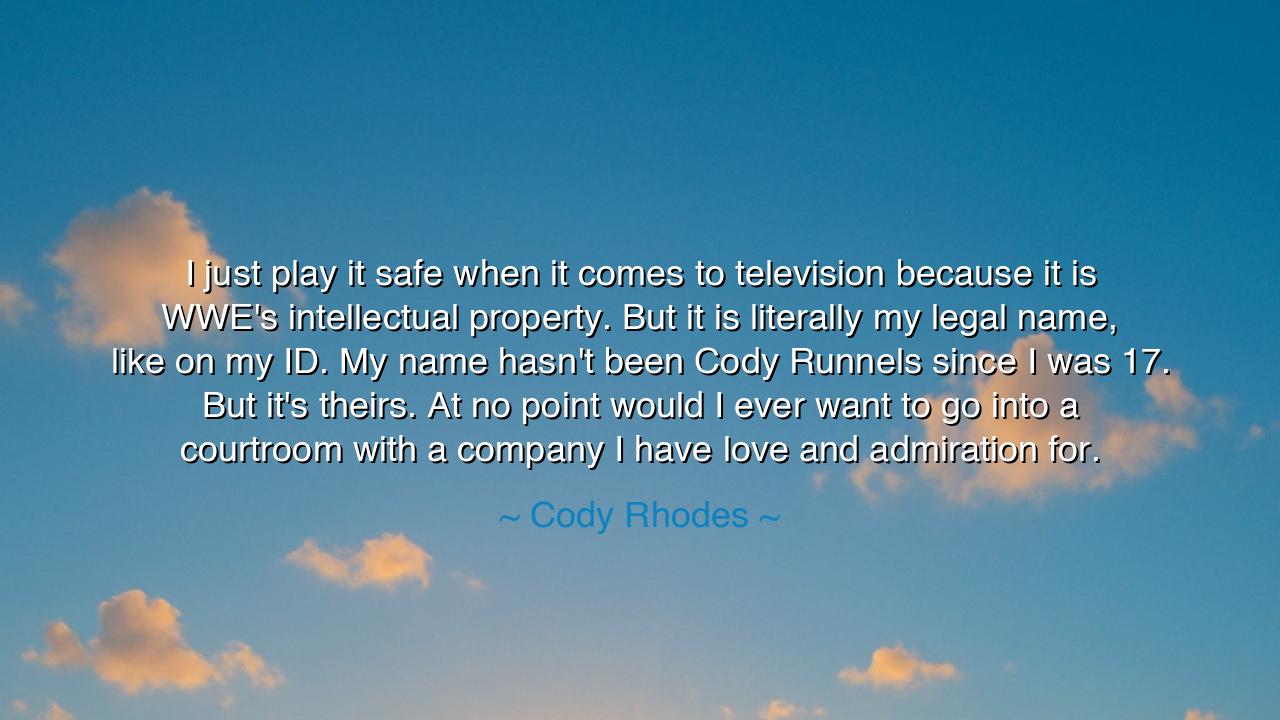
I just play it safe when it comes to television because it is
I just play it safe when it comes to television because it is WWE's intellectual property. But it is literally my legal name, like on my ID. My name hasn't been Cody Runnels since I was 17. But it's theirs. At no point would I ever want to go into a courtroom with a company I have love and admiration for.






"I just play it safe when it comes to television because it is WWE's intellectual property. But it is literally my legal name, like on my ID. My name hasn't been Cody Runnels since I was 17. But it's theirs. At no point would I ever want to go into a courtroom with a company I have love and admiration for." Thus spoke Cody Rhodes, son of Dusty Rhodes, heir to a legacy of ring and spectacle, revealing the paradox of identity in the modern age: that even one’s own name, carved into the fabric of family and blood, may be claimed as property by the hands of corporations. His words are not spoken in bitterness, but in reverence and caution, showing how deeply intertwined love and law, loyalty and legality can become in the life of an artist.
The origin of this wisdom lies in the nature of intellectual property—the idea that creations of the mind, whether a name, a character, or a story, can be owned, licensed, and controlled. In the world of professional wrestling, where spectacle and persona are as vital as skill, companies like WWE hold tight to the names they cultivate. Cody Rhodes, though born as Cody Garrett Runnels, became "Cody Rhodes" under the banner of WWE. Yet when he left, he found that the very identity he had lived for years was bound to contracts, owned not by him, but by the company. His reflection reveals the strange and unsettling truth: that the line between self and intellectual property can blur until even a man’s own name becomes contested ground.
History has witnessed this conflict in other realms. Consider the story of Prince, the legendary musician who once changed his name to an unpronounceable symbol to protest his record label’s ownership of his music and stage identity. He declared himself a “slave” to the corporate system that controlled his art, his name, and his output. Though revered around the world, he wrestled against the bondage of contracts that sought to dictate not only what he could release but how he could present himself. Like Cody Rhodes, Prince’s struggle was not merely about fame or fortune—it was about identity, autonomy, and the right to own oneself.
Rhodes’ words are heavy with respect. He admits he would never wish to battle WWE in a courtroom, for he holds love and admiration for the company that gave him a stage and helped shape his career. This tension between affection and restraint shows us the complex dance of gratitude and independence. He chooses not to fight, not out of fear, but out of honor—recognizing that some battles of law can corrode bonds of the heart. In this, he teaches us that wisdom often lies not in claiming every right, but in choosing which struggles are worth the scars they bring.
His reflection also speaks to the fragility of legacy. For Cody is not just himself; he is the son of the "American Dream," Dusty Rhodes, whose name and persona carried weight in the annals of wrestling. To bear the name Rhodes is to carry fire, history, and expectation. Yet to see that name treated as property by others is to feel a fracture in the soul. He navigates this by acknowledging the reality—"it's theirs"—while still carrying pride in his lineage. This balance of humility and defiance is the mark of a man who knows both who he is and what he owes.
The lesson is clear: protect your name, your craft, your identity, for they are more precious than gold. Yet also know that battles over ownership may cost more than they give. Choose wisely where to fight and where to yield. The law may declare who owns a name, but no court, no contract, no company can ever own the spirit behind it. Your true identity lives not on paper but in the lives you touch and the legacy you leave.
What practical steps must we take? If you are a creator, understand the terms by which you give your work to others. Guard your rights where you can, but also carry yourself with wisdom, knowing that love and respect may sometimes outweigh confrontation. Remember that your true self is deeper than contracts, that what you are cannot be stolen, even if a name is claimed. And in your own life, never confuse what is legal property with what is eternal identity.
So let Cody Rhodes’ words be remembered: even when names are owned, the soul remains free. A man may respect the law, he may bow to contracts, but no power can erase the truth of who he is. For identity, when rooted in legacy and spirit, belongs not to companies or courts, but to the eternal story of one’s life.






AAdministratorAdministrator
Welcome, honored guests. Please leave a comment, we will respond soon